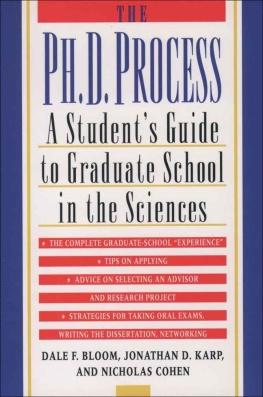Is Graduate School Really for You?
IS GRADUATE SCHOOL
REALLY FOR YOU?
The Whos, Whats, Hows, and Whys
of Pursuing a Masters or Ph.D.
AMANDA I. SELIGMAN

2012 The Johns Hopkins University Press
All rights reserved. Published 2012
Printed in the United States of America on acid-free paper
9 8 7 6 5 4 3 2 1
The Johns Hopkins University Press
2715 North Charles Street
Baltimore, Maryland 21218-4363
www.press.jhu.edu
Library of Congress Cataloging-in-Publication Data
Seligman, Amanda I.
Is graduate school really for you? : the whos, whats, hows, and whys of pursuing a masters or Ph.D. / Amanda I. Seligman.
p. cm.
Includes bibliographical references and index.
ISBN -13: 978-1-4214-0460-8 (hardcover : alk. paper)
ISBN -13: 978-1-4214-0461-5 (pbk. : alk. paper)
ISBN -13: 978-1-4214-0482-0 (electronic)
ISBN -10: 1-4214-0460-5 (hardcover : alk. paper)
ISBN -10: 1-4214-0461-3 (pbk. : alk. paper)
ISBN -10: 1-4214-0482-6 (electronic)
1. Universities and collegesGraduate workHandbooks, manuals, etc. 2. Graduate studentsHandbooks, manuals, etc. 3. Dissertations, AcademicHandbooks, manuals, etc. I. Title.
LB 2371. S 56 2012
378.155dc23 2011021672
A catalog record for this book is available from the British Library.
Special discounts are available for bulk purchases of this book. For more information, please contact Special Sales at 410-516-6936 or specialsales@press.jhu.edu.
The Johns Hopkins University Press uses environmentally friendly book materials, including recycled text paper that is composed of at least 30 percent post-consumer waste, whenever possible.
To my friends from graduate school, especially Jared,
Graham, and Rebecca, who did so much to get me through;
and with special gratitude to Ricki, who inspired this book
Preface
Every year in the United States, hundreds of thousands of students who aspire to earn masters degrees and doctorates start graduate school. Many new graduate students know a lot about their fields of study, perhaps having pursued them as undergraduate majors or worked as research assistants on professors projects. Others are discipline changers or autodidacts, who explored their topics individually, outside of standard education tracks. Some have obtained advanced degrees in their native countries but are new to the U.S. system of education. However much new graduate students know about their fields, most know little about graduate school. Unless they were raised in a family of academics, enjoyed excellent undergraduate mentoring, or pursued a graduate degree previously, the experience of graduate school itself is probably new, unfamiliar, daunting, and exhilarating, all at the same time.
The purpose of this book is to demystify the institution of graduate education in the United States for people who do not yet know much about it. I describe how people decide where to earn a masters or doctoral degree, financial issues, academic culture, the processes of graduate education, and job prospects. The main focus is how graduate school works. I also include voices, comments from real graduate students reflecting on their experiences. Expert Tips from faculty and other experienced students provide guidance on some of the stickier situations graduate students find themselves in. The sources for these quotations are provided in a separate section at the end, preceding the endnote references. A glossary at the back of the book defines academic terms that may be unfamiliar. Finally, a bibliography suggests further reading, especially for people seeking detailed advice about succeeding in graduate education.
This book is written for people who want to know more about what graduate school is like, whether they are thinking about applying to programs, are already enrolled, or just want to understand what education beyond the college level entails. Undergraduates can learn about how to apply to the programs of their choice and what to expect there. Current graduate students can use it as a roadmap through their programs. International students may find that the U.S. systems expectations differ from their home-country norms. People who love graduate students but do not understand how they are spending their time will find straightforward explanations of the process. This book focuses primarily on the liberal arts rather than the kinds of professional training offered by M.B.A., J.D., M.D., and other degree programs.
One of the things biggest hurdles in graduate school is the thesis or dissertation, a project that is usually essential to completion of the degree. It is hard because producing original scholarship for the first time is more than just coming up with new ideas; it also entails engaging in an unfamiliar process of research and writing. A student must figure out how to manage a large-scale, independent scholarly project at the same time as understanding a phenomenon no one has ever explained before. The same thing is true of graduate school at large. Graduate school, in the liberal arts, at least, is not just an extension of the undergraduate degree. As one of my friends explained in the orientation to my doctoral program, the point of the exercise is to change the student from a consumer of scholarship into a producer of scholarship. Figuring out how to navigate this transformationan intensely personal onemakes graduate school scary and exciting at the same time.
The information and advice I offer come from a range of sources. I first imagined this book when I was studying for my doctorate in American history at Northwestern University and teaching ethnography alongside sociologists and anthropologists. They taught me that I should understand what I was doing as well as what I was I also read regularly in such online discussions as the forums of the Chronicle of Higher Education online and PhinisheD.org. To round out the gaps in my knowledge, I read advice manuals, scholarship, and other reflections on graduate education. Quotations from these accounts are displayed in these pages as Voices and Expert Tips.
Although I offer advice about navigating the strange institutional cultures that graduate students encounter, I make no pretense of telling readers how to succeed in graduate school. Beyond the shared and implicit goal of graduating, not all graduate students have the same purpose in mind when they enroll. Some students enroll in masters programs in order to learn about something they got only a taste of in college; others see their degree programs as a way of learning new skills that will increase their value in the private sector. Many doctoral students know that earning a Ph.D. is a prerequisite to winning a job as a professor, but not all their peers share that aspiration. Significantly, many students goals change over the course of their studies. Some decide that, after all, they do want to be professors; others realize they hate academic life and want nothing more than to drop out of their programs with their dignity intact. Because of the variety of their ambitions, I believe that no single model of success can guide all students through the process. Instead, each graduate student needs to understand how his goals articulate with the culture of his field of study.
I strive in these pages for a neutral description of the culture, expectations, and experiences of graduate school. Other scholars have written books with more direct advice about how to succeed in graduate school. Such books, whose merits vary widely, are listed and described in the For Further Reading section. Many assume that every graduate student starts at 22 years old, wants to be a professor, will not consider any other career, and is willing to put his or her personal life on hold for the time it takes to earn a graduate degree (and probably tenure as well). My hope is that by describing what graduate study is and how it works, readers will be able to work out for themselves what they need to do to satisfy their particular purposes.
Next page

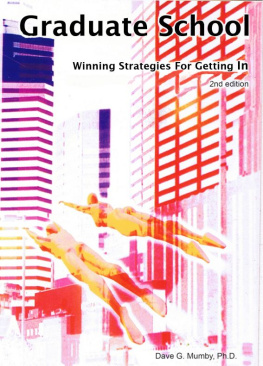
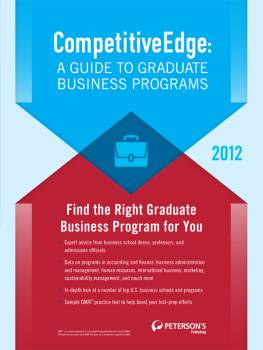

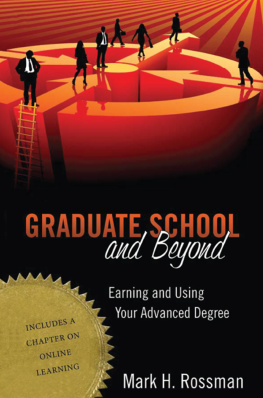
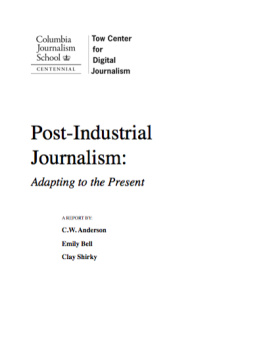
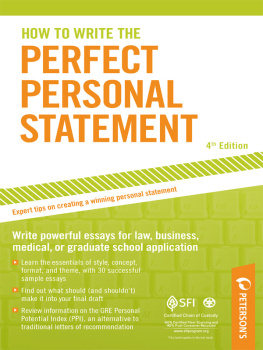
![Reding - Grads Guide to Graduate Admissions Essays] : Examples from Real Students Who Got into Top Schools](/uploads/posts/book/101661/thumbs/reding-grad-s-guide-to-graduate-admissions.jpg)
